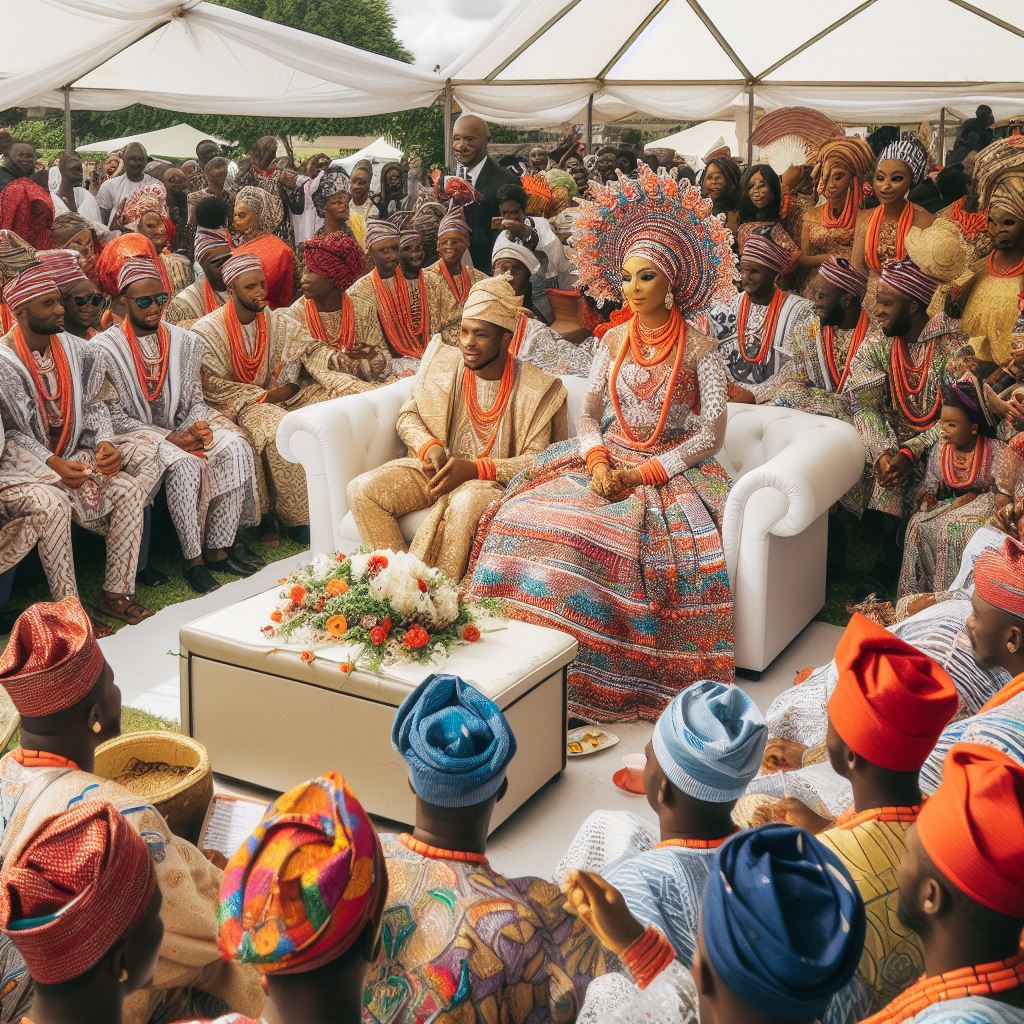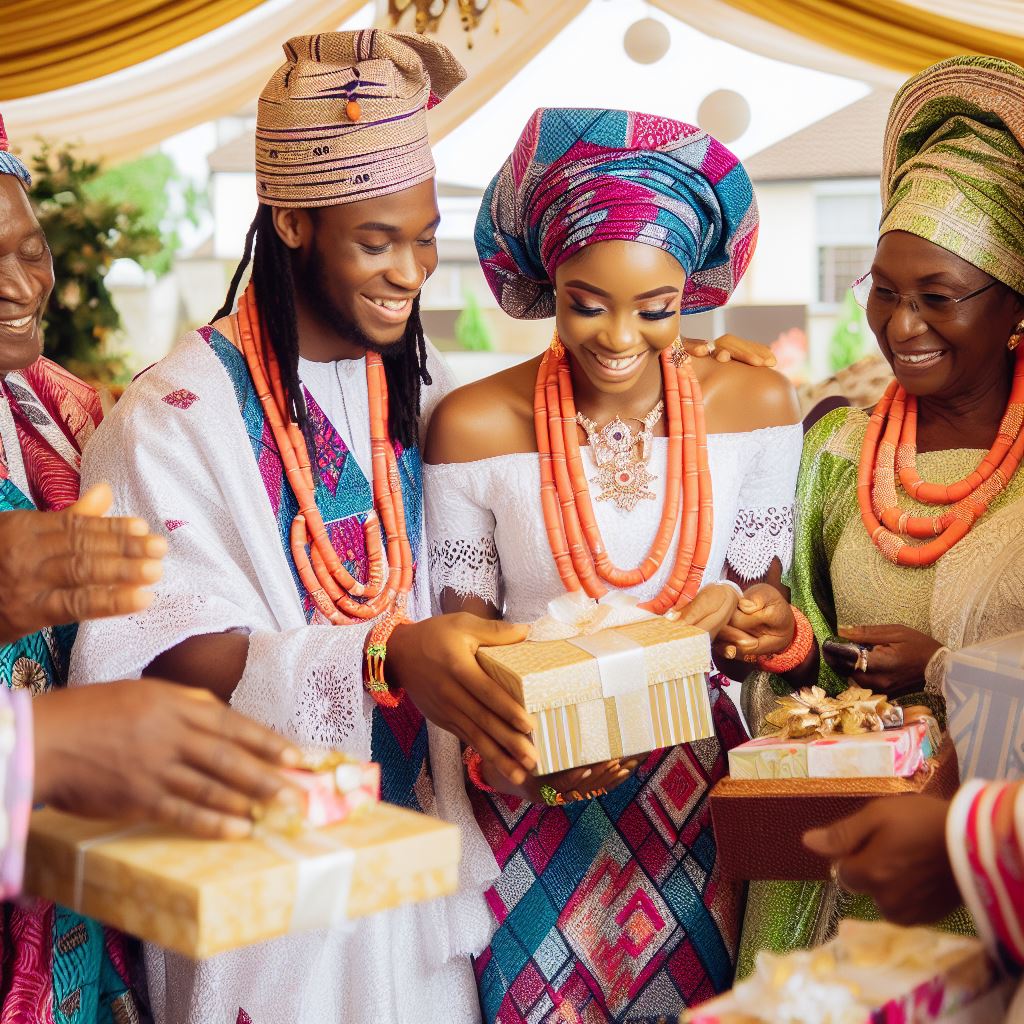Introduction
Love and commitment are vital aspects of Nigerian marriages, defining the lasting bond between couples.
In this context, love represents a deep affection and emotional connection, while commitment signifies loyalty, dedication, and long-term investment in the relationship.
Understanding these concepts is crucial to experiencing a successful marriage in Nigeria, as they lay the foundation for mutual growth, support, and satisfaction.
Without love and commitment, marriages become vulnerable to misunderstandings, conflicts, and eventual dissolution.
Love and commitment are the pillars that uphold a thriving Nigerian marriage, as they provide the necessary stability and security for both partners.
Love helps couples navigate challenges, inspiring them to work together, understand each other’s needs, and create emotional intimacy.
On the other hand, commitment encourages spouses to stay devoted, even during difficult times, fostering trust and loyalty.
Without question, love and commitment are like fuel to a marriage, igniting the flame that keeps it burning through countless seasons.
As the saying goes, “Love conquers all.” In Nigerian marriages, love and commitment are the driving forces behind the longevity and endurance of the union.
Every Nigerian couple yearns for a successful and fulfilling marriage, and it is through love and commitment that this desire is brought to life.
Therefore, it is imperative that couples continue to prioritize love and commitment in their relationships, as they are the core values that sustain marriages in Nigeria.
By understanding their significance and actively practicing them, couples can strengthen their bonds, weather storms, and experience profoundly joyful and lasting partnerships.
Love in Nigerian Marriages
In Nigerian culture, love’s essence goes beyond surface attraction and holds a deeper, complex meaning.
Traditional perspectives view love within the framework of community bonds, emphasizing family unity over individual desires.
Historically, arranged marriages were common in traditional Nigerian societies.
Love was expected to grow over time as couples navigated their life journey together.
It was considered a collective decision, focusing on the greater good of the community.
However, modern influences and globalization have reshaped the concept of love in Nigerian marriages.
Western ideals of romantic love, often portrayed in media, have significantly impacted how Nigerians perceive love and relationships.
Young Nigerians are increasingly influenced by these Western notions.
In contemporary Nigeria, love has become more individualistic, emphasizing compatibility and emotional connections.
While traditional beliefs still have significance, families often grant couples more autonomy in choosing their life partners.
The story of Tunde and Ngozi exemplifies love’s importance in Nigerian marriages.
Initially friends, their companionship evolved into a deep love built on mutual respect and understanding.
Despite initial family doubts, Tunde and Ngozi’s love eventually won their full support.
Love serves as the bedrock of Nigerian marriages, transcending initial attraction.
It offers strength to couples as they navigate the complexities of married life, acting as an emotional bond that fosters commitment and resilience.
Basically, love is a cornerstone of Nigerian marriages, blending tradition with modern influences.
While cultural perspectives hold their importance, the role of individual desires and emotions in love is increasingly recognized, making it a beautiful amalgamation of the past and the present.
Read: A Collection of Hausa Anniversary Wishes for Best Friends
Commitment in Nigerian Marriages
In order for a marital relationship to thrive, commitment plays a vital role.
It is the glue that holds a Nigerian marriage together and ensures its longevity.
The importance of commitment cannot be understated, as it serves as the foundation upon which all other aspects of the relationship are built.
Importance of commitment in sustaining a marital relationship
- Commitment creates a sense of security and emotional stability within the marriage.
It provides the reassurance that both partners are fully invested in making the relationship work. - Commitment fosters trust and loyalty between spouses.
Knowing that your partner is committed to you and the marriage allows for open and honest communication, which strengthens the bond between them. - Commitment helps couples navigate through challenges and difficulties.
When faced with obstacles, committed partners are more likely to work together to find solutions, rather than giving up easily. - Commitment encourages personal growth and selflessness.
It requires individuals to prioritize their partner’s needs and well-being, creating a shared sense of purpose and unity. - Commitment provides a strong foundation for raising a family.
It ensures the stability and support required for children to thrive within a loving and secure environment.
Cultural and societal factors that influence commitment in Nigerian marriages
- The concept of commitment is deeply embedded in Nigerian culture.
Traditional values and norms emphasize the importance of marriage as a lifelong commitment. - Religion plays a significant role in shaping commitment within Nigerian marriages.
Religious teachings emphasize fidelity, loyalty, and the sanctity of marriage. - The influence of extended family and community is instrumental in upholding commitment within Nigerian marriages.
The collective support and expectations from these networks encourage couples to remain committed. - Social stigma associated with divorce or separation motivates Nigerian couples to work harder at their marriage and endure through challenging times.
Personal commitment vs. collective commitment in Nigerian marriages
In Nigerian marriages, commitment can be viewed from both an individual and collective perspective.
Personal commitment refers to the dedication and loyalty individuals have towards their spouse and the marriage.
It involves making conscious efforts to prioritize the relationship and fulfill one’s role as a partner.
Personal commitment is crucial in maintaining the emotional connection and happiness within the marriage.
Collective commitment, on the other hand, emphasizes the role of the community and the extended family in upholding the marriage.
It involves a shared responsibility to support and guide the couple, ensuring their commitment to one another remains strong.
This collective commitment provides a sense of accountability and reinforces the importance of preserving the marriage for the benefit of the entire community.
Therefore, commitment is the cornerstone of Nigerian marriages.
It holds immense significance in sustaining a marital relationship by providing emotional security, trust, and resilience.
Cultural and societal factors, along with personal and collective commitment, all contribute to the strength and longevity of Nigerian marriages.
Read: Exploring Nigerian Wedding Vows and Their Meanings

Discover More: Christian, Islamic, & Customary: Marriage Definitions Explored
The Interplay Between Love and Commitment
- Love and commitment form the bedrock of Nigerian marriages, mutually reinforcing one another.
- While love initiates the emotional connection, commitment sustains it, ensuring a lasting relationship.
- A case study of Amina and Ahmed exemplifies this interplay between love and commitment.
- Their love sparked the initial passion, but it was their unwavering commitment that upheld their marriage.
- Facing adversity, their commitment fortified them, emphasizing its pivotal role in challenging times.
- Love may waver under pressure, but commitment acts as an anchor in tumultuous seas.
- Beyond durability, love and commitment contribute to relationship growth and mutual support.
- Commitment nurtures trust, intimacy, and security, while love fosters compassion and empathy.
- The synergy of love and commitment motivates couples to continually enhance themselves and their marriage.
- A solid foundation of both elements enables couples to navigate challenges and celebrate milestones together.
- This interplay results in fulfilling and enduring partnerships, essential for happiness and success.
- Nigerian couples acknowledge the interdependence of love and commitment, valuing and nurturing both aspects.
Read: Tradition Meets Modernity: Nigerian Wedding Quotations
Challenges to Love and Commitment in Nigerian Marriages
Economic factors that can strain marital love and commitment
- Financial instability can create tension and stress within the relationship.
- Unemployment or low income can lead to feelings of inadequacy and dependence.
- Differences in spending habits and financial priorities can cause conflicts.
- Materialistic values and the pursuit of wealth can overshadow emotional connection.
- Unequal distribution of financial responsibilities can create resentment and inequality.
Influence of external forces such as societal pressure and family expectations
- Societal expectations of gender roles can put strain on the dynamics of the marriage.
- Pressure to conform to cultural and religious traditions may limit individual freedom and expression.
- Family expectations regarding marriage partners and lifestyle choices can lead to conflicts.
- Interference from extended family members can disrupt the couple’s unity and autonomy.
- Comparison to other successful marriages can create feelings of inadequacy and dissatisfaction.
Tips or strategies to overcome challenges and strengthen love and commitment in Nigerian marriages
- Establish open and honest communication to address financial concerns and find collaborative solutions.
- Create a shared vision for the future that includes both individual and collective goals.
- Practice empathy and understanding towards each other’s financial habits and priorities.
- Focus on shared experiences and emotional connection rather than material possessions.
- Develop a fair and balanced financial plan that includes both partners’ contributions and aspirations.
- Challenge societal norms and expectations by defining and prioritizing your own values as a couple.
- Set boundaries with family members to protect the couple’s privacy and autonomy.
- Seek professional help or counseling to navigate family pressures and conflicts.
- Celebrate and appreciate the unique qualities and strengths of your own marriage rather than comparing it to others.
- Invest time and effort in nurturing the emotional intimacy and connection within the relationship.
Read: From Engagement to Marriage: Nigerian Love Sayings
Conclusion
Love and commitment are the core foundations of Nigerian marriages.
Throughout this blog section, we have explored the significance of these elements in sustaining a healthy and successful relationship.
Love forms the basis of a thriving marriage, as it fosters understanding, tolerance, and empathy between partners.
It creates a deep emotional connection and fuels the desire to grow and support each other.
Commitment, on the other hand, is the glue that holds a marriage together.
It involves a conscious decision to prioritize the relationship and work through challenges.
Also, It requires dedication, loyalty, and the willingness to compromise for the greater good.
It is crucial for individuals to prioritize love and commitment in their own relationships.
By doing so, they can cultivate a strong foundation that can withstand the test of time.
Couples should strive to constantly nurture their love, communicate effectively, and be open to growth and changes.
Love and commitment should not be taken for granted.
Embracing these values will not only enhance the quality of our marriages but also contribute to the overall well-being and happiness of our families and society as a whole.
In light of this, I encourage all readers to reflect on their own relationships and recommit to fostering love and commitment.
Let us invest our time, energy, and efforts into building deep connections and resilient partnerships that stand the test of time.
As we bring this blog section to a close, I leave you with a thought-provoking question: How will you prioritize love and commitment in your relationships, starting today?




